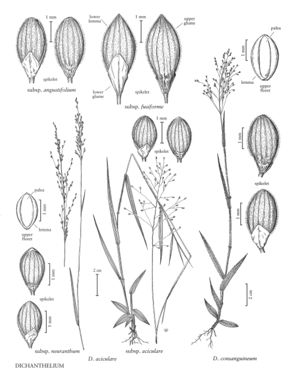Difference between revisions of "Dichanthelium aciculare subsp. angustifolium"
Synonyms: Panicum arenicoloides unknown Panicum angustifolium unknown Panicum aciculare var. angustifoliutn unknown
Treatment appears in FNA Volume 25. Treatment on page 444.
FNA>Volume Importer |
FNA>Volume Importer |
||
| Line 7: | Line 7: | ||
|name=Panicum arenicoloides | |name=Panicum arenicoloides | ||
|authority=unknown | |authority=unknown | ||
| − | }}{{Treatment/ID/Synonym | + | }} {{Treatment/ID/Synonym |
|name=Panicum angustifolium | |name=Panicum angustifolium | ||
|authority=unknown | |authority=unknown | ||
| − | }}{{Treatment/ID/Synonym | + | }} {{Treatment/ID/Synonym |
|name=Panicum aciculare var. angustifoliutn | |name=Panicum aciculare var. angustifoliutn | ||
|authority=unknown | |authority=unknown | ||
| Line 24: | Line 24: | ||
-->{{Treatment/Body | -->{{Treatment/Body | ||
| − | |discussion=<p>Dichanthelium aciculare subsp. angustifolium grows in open pine woodlands, often in sandy soil with needle duff. It is restricted to the southeastern United States.</p> | + | |discussion=<p><i>Dichanthelium aciculare </i>subsp.<i> angustifolium</i> grows in open pine woodlands, often in sandy soil with needle duff. It is restricted to the southeastern United States.</p> |
|tables= | |tables= | ||
|references= | |references= | ||
| Line 44: | Line 44: | ||
|publication year= | |publication year= | ||
|special status= | |special status= | ||
| − | |source xml=https://jpend@bitbucket.org/aafc-mbb/fna-data-curation.git/src/ | + | |source xml=https://jpend@bitbucket.org/aafc-mbb/fna-data-curation.git/src/8f726806613d60c220dc4493de13607dd3150896/coarse_grained_fna_xml/V25/V25_1206.xml |
|subfamily=Poaceae subfam. Panicoideae | |subfamily=Poaceae subfam. Panicoideae | ||
|tribe=Poaceae tribe Paniceae | |tribe=Poaceae tribe Paniceae | ||
Revision as of 16:29, 18 September 2019
Plants cespitose. Culms usually 35-75 cm, usually pubescent, at least on the lower internodes. Midculm blades 6-16 cm, usually glabrous. Primary panicles open, branches spreading, not appearing 1-sided. Spikelets 2.4-3 mm, narrowly obovoid to ellipsoid, often pointed to beaked. Lower glumes attached less than 0.2 mm below the upper glumes.
Discussion
Dichanthelium aciculare subsp. angustifolium grows in open pine woodlands, often in sandy soil with needle duff. It is restricted to the southeastern United States.
Selected References
None.
Lower Taxa
None.
... more about "Dichanthelium aciculare subsp. angustifolium"
